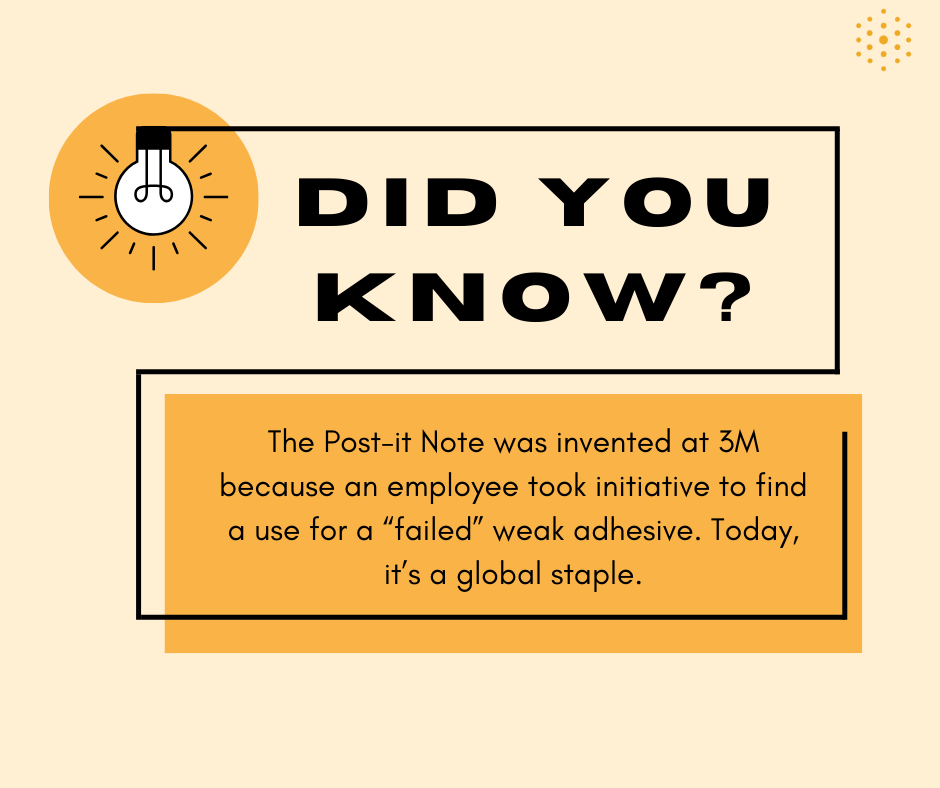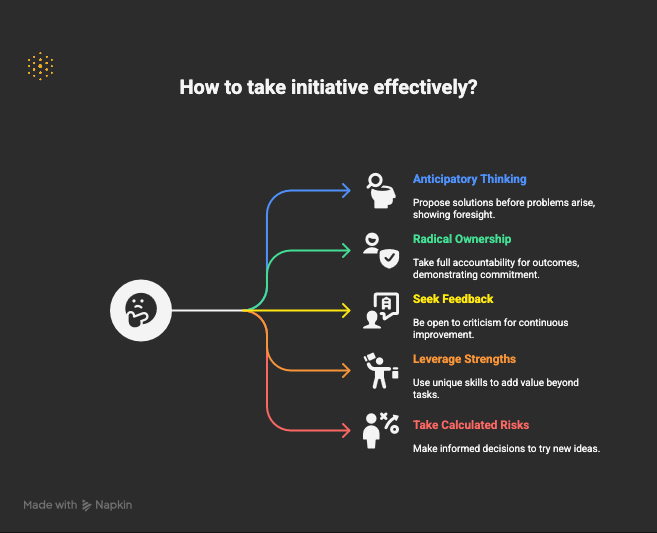How to take initiative at work and stand out?
Anticipate problems, propose fixes, and own results to demonstrate initiative. Seek specific feedback, play to your strengths, and test small, low-risk experiments, then document outcomes and improve quickly.
Taking initiative isn’t about working longer hours or being the loudest voice in the room.
It’s about acting before you’re asked, solving problems instead of passing them along, and owning outcomes fully.
And here’s the kicker: people are far more capable of it than they realize.
A study cited by the Haiilo found that 85% of employees take more initiative when they receive feedback in the workplace.
That means initiative isn’t reserved for “natural leaders”, it’s a skill you can strengthen with the right habits.
Here are 5 practical ways to build initiative into your everyday work, from anticipating challenges before they arise to taking calculated risks that push your career forward.
1. Master the Art of Anticipatory Thinking
Most people wait for a problem to happen before they react. A person with true initiative anticipates potential problems before they arise.
This mindset, known as anticipatory thinking, is a game-changer. It shows foresight and strategic thinking, qualities that managers and leaders notice immediately.
According to Whitehall Training, to develop foresight, you should "regularly assess your department's needs and potential future challenges" and "propose solutions before problems become critical".
Your Action Plan
- Conduct a “What-If” Analysis: Look at a regular team process and ask, “What could go wrong here?” For example, if your team relies on a single shared document, propose a backup plan or a more robust project management tool to prevent a potential disaster. This level of foresight demonstrates a high level of ownership.
- Present Solutions, Not Just Problems: If you identify a potential bottleneck, don’t just bring it up in a meeting. Come prepared with 2-3 well-thought-out solutions, highlighting the pros and cons of each. This transforms you from a worrier into a strategic thinker.
2. Practice "Radical Ownership"
Taking initiative isn't about being perfect; it's about being fully accountable.
The concept of "radical ownership" means you are not just responsible for your tasks, but also for the outcomes - both good and bad.
Your Action Plan
- Be the Fixer: If a project you're working on has an issue, take the lead in finding the root cause and fixing it, even if it wasn't your fault. This shows that you are committed to the team's success above all else.
- Use the STAR Method in Real Life: The STAR method (Situation, Task, Action, Result) is a common way to answer interview questions, but it's also a powerful tool for self-reflection. When you've taken initiative on a project, document it using this format. This helps you understand the impact of your actions and builds confidence for future opportunities.

3. Seek Feedback to Fuel Your Initiative
It might seem counterintuitive, but a massive part of taking initiative is being open to feedback.
When you actively seek constructive criticism, you show that you are humble, teachable, and committed to growth.
Your Action Plan
- Ask for the “What Could I Have Done Better?” Question: After a project or a difficult task, ask your manager or a trusted colleague for specific feedback. Frame the question to get actionable advice: "What's one thing I could have done differently to make that process smoother?"
- Don't Just Listen, Act: The key is to not just hear the feedback but to immediately apply it. This shows that you value your colleagues' input and that you are committed to continuous improvement.
4. Leverage Your Strengths to Go Above and Beyond
You don't have to be a superhero to take initiative. Instead of trying to do everything, focus on leveraging your unique strengths to go the extra mile.
For example, if you're a skilled communicator, offer to take on the responsibility of summarizing team meetings or drafting a weekly status report.
This provides value to the team and showcases your abilities in a way that feels natural and impactful.
Your Action Plan
- Identify Your "Zone of Genius": What do you do better than anyone else on your team? Is it writing, problem-solving, or client communication? Find opportunities to apply this skill in a way that benefits the team.
- Go Beyond the Task: If you are asked to draft a memo, offer to also create a simplified chart or infographic to accompany it. If you are asked to organize a meeting, suggest a new agenda format to make it more efficient. This small but meaningful extra effort demonstrates true initiative.
5. Take "Calculated" Risks
Many people avoid taking initiative because they fear failure. But taking initiative often requires a willingness to take a calculated risk.
This isn't about recklessness; it's about making an informed decision to try something new, even if the outcome is uncertain.
Your Action Plan
- Start Small: Don't start by proposing a company-wide restructure. Begin with a smaller, low-stakes project where you can test an idea. For example, suggest a new tool for a small team project before proposing it for the entire department.
- Frame Your Idea as an Experiment: When you present a new idea, frame it as a low-risk experiment. For example, "I'd like to try this new process for two weeks and then report back on the results." This lowers the barrier to entry and shows that you've thought through the potential outcomes.
Also Read: How to leverage your work experience for career growth?

Wrapping Up
Initiative is what turns reliable employees into indispensable ones.
By anticipating problems, owning outcomes, seeking feedback, and taking smart risks, you set yourself apart in ways that managers notice and reward.
And if you’re looking to strengthen those same skills beyond the workplace, Hiration can help.
From practicing interviews that test your ability to think on your feet to optimizing resumes and LinkedIn profiles that highlight proactive achievements, Hiration is designed to help you showcase initiative at every stage of your career.
Small, consistent steps toward initiative can create an outsized impact on both your work and career growth.
Frequently Asked Questions
-
What does it mean to take initiative at work?
You act before you’re asked, solve problems instead of passing them along, and own outcomes fully. You focus on foresight and accountability rather than extra hours or noise.
-
How do you practice anticipatory thinking at work?
Anticipate potential problems before they arise, then prepare responses. Regularly assess your department’s needs and propose solutions early to show foresight and strategic thinking.
-
How do you present solutions instead of just problems?
When you spot a bottleneck, bring well-thought-out solutions and explain the pros and cons of each. This shifts you from a worrier to a strategic thinker.
-
What is radical ownership and how do you apply it?
Radical ownership means being fully accountable for outcomes, good or bad. Take the lead on fixing issues and document your actions with the STAR method to build clarity and confidence.
-
How do you use feedback to take more initiative?
Ask for specific input after projects, like "What's one thing I could have done differently to make that process smoother?" Then act on the advice immediately to demonstrate growth.
-
How can you leverage your strengths to go above and beyond?
Focus on your zone of genius and apply it where it helps the team most. Volunteer tasks that match your strengths, such as summarizing meetings or drafting a weekly status report.
-
What is a calculated risk at work, and how do you take one?
A calculated risk is an informed try at something new when the outcome is uncertain. Start small and frame your idea as a low-risk experiment to lower the barrier for approval.
-
Is taking initiative about working longer hours or being the loudest voice?
No. Taking initiative isn’t about working longer hours or being the loudest voice in the room; it’s about acting before you’re asked, solving problems, and owning outcomes.
-
Can you build initiative if you are not a natural leader?
Yes. Initiative isn’t reserved for “natural leaders”; it’s a skill you can strengthen with the right habits.
-
What small actions show initiative day to day?
Anticipate problems, propose improvements with solutions, seek constructive feedback, and take ownership of results. Small, consistent steps toward initiative can create an outsized impact on both your work and career growth.



